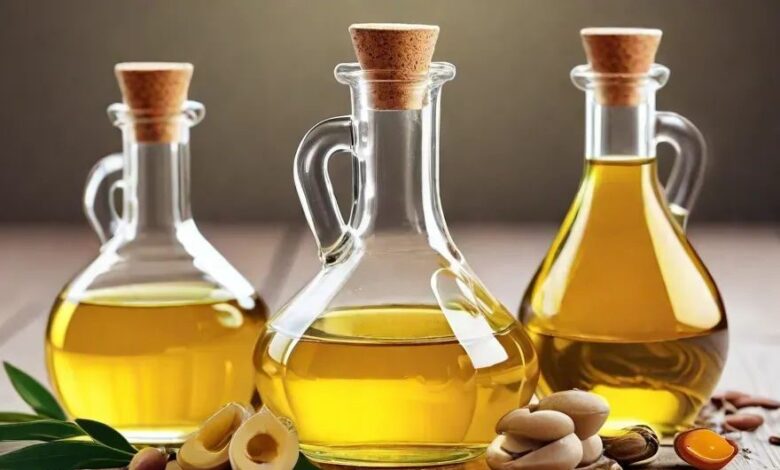
Top Best Cooking Oils: Discover the Healthiest Options for Cooking
When it comes to cooking, the type of oil used plays a crucial role in both health and flavor. Selecting the right cooking oil can significantly impact heart health and overall well-being. With a plethora of cooking oils available, from olive oil to coconut oil, understanding their health benefits and cooking properties is essential. This guide will explore various oils, helping you discover the healthiest options for your cooking methods.
The Impact of Cooking Oils on Health
Cooking oils are not only a source of flavor but also a contributor to our health. The type of oil can influence our intake of saturated fats, fatty acids, and essential nutrients. For instance, oils rich in monounsaturated and polyunsaturated fats, such as olive oil and avocado oil, are linked to lower risks of heart disease.
Meanwhile, oils high in saturated fats, like palm oil and coconut oil, can have different health implications. Understanding the health benefits and risks associated with different oils can guide us in making healthier cooking choices that align with our dietary needs.
How to Choose a Healthy Cooking Oil: Factors to Consider
When selecting a cooking oil, there are several factors to consider to ensure you choose the healthiest option. First, evaluate the smoke point of the oil, which indicates how well it performs under heat. Oils with a higher smoke point, such as avocado oil and refined olive oil, are ideal for high-temperature cooking methods like frying and sautéing.
Additionally, consider the fatty acid composition of the oil, as oils high in omega-3 and monounsaturated fats, like walnut oil and canola oil, provide significant health benefits. Lastly, opt for unrefined oils when possible, as they retain more nutrients compared to refined oils.
Olive Oil: The Heart-Healthy Superstar
Extra Virgin Olive Oil: Rich in Antioxidants and Monounsaturated Fats
Extra virgin olive oil is often hailed as one of the healthiest cooking oils available. Extracted from the first pressing of olives, this oil is rich in antioxidants and monounsaturated fats, making it a staple in healthy cooking.
The oil is high in oleic acid, which has been shown to reduce inflammation and promote heart health. Moreover, its rich flavor enhances a variety of dishes, from salads to pasta. When selecting olive oil, look for labels indicating “extra virgin” to ensure you’re getting a high-quality, unrefined product that retains its beneficial properties.
Health Benefits of Olive Oil: Heart Health, Anti-Inflammatory Properties, and More
The health benefits of olive oil extend beyond its rich flavor and culinary versatility. Studies have shown that regular consumption of olive oil can lower the risk of heart disease by improving cholesterol levels and reducing inflammation.
Its antioxidant properties help combat oxidative stress, which is linked to various chronic diseases. Additionally, olive oil has been associated with improved brain health and reduced risk of cognitive decline. With its myriad of health benefits, incorporating olive oil into your daily cooking can be a delicious and nutritious choice.
Avocado Oil: A Nutrient-Rich, Versatile Option
Health Benefits of Avocado Oil: High in Monounsaturated Fats and Antioxidants
Avocado oil has emerged as a popular cooking oil thanks to its impressive nutrient profile. Rich in monounsaturated fats, similar to olive oil, it supports heart health and helps lower bad cholesterol levels. Additionally, avocado oil is packed with antioxidants, which protect the body from free radicals.
Its light flavor makes it a versatile option for various cooking methods, from frying to drizzling over salads. Whether you’re using primal kitchen avocado oil or another brand, this oil is a fantastic addition to a healthy diet.
Avocado Oil’s High Smoke Point: Ideal for High-Heat Cooking
One of the standout features of avocado oil is its high smoke point, which makes it suitable for high-temperature cooking methods like deep frying and grilling. With a smoke point of around 520°F, avocado oil can withstand higher temperatures without breaking down or producing harmful compounds.
This property allows for healthier cooking without sacrificing flavor. Using avocado oil in your cooking can provide a delicious taste while ensuring that your meals are prepared safely and healthily, making it an essential oil for any kitchen.
Coconut Oil: A Controversial Yet Popular Choice
Health Benefits of Coconut Oil: MCTs, Metabolism, and Potential Weight Loss Benefits
Coconut oil has gained popularity for its unique health benefits, particularly due to its medium-chain triglycerides (MCTs). These fats are metabolized differently than long-chain fatty acids, providing a quick source of energy.
Some studies suggest that MCTs may aid in weight loss by boosting metabolism and reducing appetite. However, it’s important to use coconut oil in moderation, as it is also high in saturated fats. Understanding how to incorporate coconut oil into your diet can help you enjoy its benefits while maintaining a balanced intake of fats and oils.
The Debate Over Saturated Fat: Understanding Coconut Oil’s Role in a Healthy Diet
The role of saturated fat in our diet remains a topic of debate, especially concerning coconut oil. While some advocate for its use due to its MCTs and potential health benefits, others warn against excessive consumption due to its high saturated fat content.
Research indicates that moderate consumption of coconut oil may not have adverse effects on heart health for most individuals, but it’s essential to balance it with other healthier oils, like olive and avocado oil. By understanding the nuances of saturated fat and coconut oil’s role in a healthy diet, you can make informed choices that best suit your health needs.
Flaxseed Oil: Omega-3 Fatty Acids for a Healthier Heart
The Role of Omega-3s: Flaxseed Oil’s Impact on Heart Health and Inflammation
Flaxseed oil is an excellent source of omega-3 fatty acids, which are essential for maintaining heart health and reducing inflammation. These healthy fats have been shown to lower blood pressure, improve cholesterol levels, and decrease the risk of heart disease.
Including flaxseed oil in your diet can also support brain health and may help alleviate symptoms of depression and anxiety. When cooking, consider using flaxseed oil in cold dishes, such as salad dressings, to preserve its beneficial properties and enjoy its nutty flavor.
Best Ways to Incorporate Flaxseed Oil Into Your Diet
Incorporating flaxseed oil into your diet can be both easy and delicious. One of the simplest ways is to add it to smoothies, where it can blend seamlessly with fruits and vegetables while boosting nutritional content. You can also drizzle flaxseed oil over salads or cooked vegetables for an added flavor boost.
Additionally, using flaxseed oil in homemade dips and spreads can enhance their health benefits. Remember, flaxseed oil should not be heated, as this can compromise its quality, so always use it in low-temperature cooking or raw applications.
Walnut Oil: Rich in Omega-3s and Antioxidants
The Health Benefits of Walnut Oil: Heart Health and Anti-Inflammatory Effects
Walnut oil is rich in omega-3 fatty acids and antioxidants, making it an excellent choice for promoting heart health. These beneficial compounds help reduce inflammation and improve cardiovascular function. Incorporating walnut oil into your diet can support cognitive function and may lower the risk of chronic diseases.
Its unique, nutty flavor makes it a delightful addition to salad dressings, marinades, and baked goods. By choosing walnut oil as part of your healthy cooking oils, you can enjoy its health benefits while enhancing the flavor of your meals.
Grapeseed Oil: A Mild, Heart-Healthy Option
Nutritional Benefits of Grapeseed Oil: High in Polyunsaturated Fats and Vitamin E
Grapeseed oil is a heart-healthy option known for its high content of polyunsaturated fats and vitamin E. This oil can help lower bad cholesterol levels and improve overall heart health. Its light flavor makes it versatile for various cooking methods, including frying and sautéing.
Grapeseed oil also contains antioxidants that combat oxidative stress and promote skin health. Utilizing grapeseed oil in your daily cooking can provide significant health benefits without overpowering the flavors of your dishes.
Cooking with Grapeseed Oil: High Smoke Point and Versatility
With a high smoke point of around 420°F, grapeseed oil is ideal for high-temperature cooking methods, including frying and searing. Its mild flavor allows it to blend well with other ingredients, making it a versatile choice in the kitchen.
Additionally, grapeseed oil can be used as a base for homemade salad dressings, marinades, or cooking sprays. By incorporating grapeseed oil into your cooking repertoire, you can enjoy both its health benefits and culinary flexibility.
Canola Oil: A Popular, Budget-Friendly Cooking Oil
Health Benefits of Canola Oil: Omega-3 Fatty Acids and Low Saturated Fat
Canola oil is a widely used cooking oil praised for its health benefits, including a favorable fatty acid profile. It is low in saturated fat and high in omega-3 fatty acids, making it a heart-healthy option for everyday cooking.
Canola oil is also rich in vitamin E, an antioxidant that supports skin health. Its neutral flavor and high smoke point make it a versatile choice for various cooking methods, from frying to baking. Incorporating canola oil into your diet can help maintain a balanced intake of healthy fats.
Is Canola Oil Really Healthy? What the Latest Research Says
The healthiness of canola oil has been debated in recent years, with some studies linking it to potential health risks. However, the majority of research supports its benefits when used in moderation and as part of a balanced diet.
Canola oil’s omega-3 content can contribute to heart health, as it may lower cholesterol levels and reduce inflammation. To make informed choices, it is essential to consider the source and processing of the oil, opting for high-quality, cold-pressed brands whenever possible.
The Best Oils for High-Heat Cooking
Comparing Smoke Points: Which Oils Are Best for Frying, Sautéing, and Grilling?
When it comes to high-heat cooking, the smoke point of oils is a critical factor to consider. Oils with higher smoke points, such as avocado oil, grapeseed oil, and refined olive oil, are ideal for frying, sautéing, and grilling. These oils can withstand high temperatures without breaking down or producing harmful compounds.
In contrast, oils like flaxseed oil and unrefined oils should be reserved for low-heat cooking or raw applications to preserve their beneficial properties. Understanding smoke points is essential for selecting the best cooking oils for your culinary needs.
How to Choose Oils for High-Temperature Cooking: Safety and Flavor Considerations
When selecting oils for high-temperature cooking, it’s important to consider both safety and flavor. Choose oils with high smoke points to avoid the production of harmful compounds that can occur when oils reach their breaking point. Additionally, consider the flavor profile of the oil, as it can enhance or detract from the dish being prepared.
For instance, using a neutral oil, like canola oil or grapeseed oil, can work well in frying, while oils with distinct flavors, such as sesame oil or olive oil, may be better suited for drizzling or finishing dishes. Balancing these factors will help you make the best choices for your cooking methods.
Oils to Avoid: What to Stay Away From for Optimal Health
Vegetable Oil and Soybean Oil: Why They May Not Be the Healthiest Choices
Vegetable oil and soybean oil are commonly used cooking oils but may not be the healthiest options available. These oils are often highly refined and may contain unhealthy trans fats, which are linked to various health issues, including heart disease. Additionally, many vegetable oils are high in omega-6 fatty acids, which can promote inflammation when consumed in excess. To support optimal health, it’s best to limit the use of these oils and opt for healthier alternatives, such as extra virgin olive oil or avocado oil.
The Dangers of Trans Fats and Hydrogenated Oils
Trans fats and hydrogenated oils pose significant health risks and should be avoided whenever possible. These fats are often found in processed foods and can contribute to increased cholesterol levels and heart disease. Trans fats are created through the hydrogenation process, which solidifies liquid oils and extends shelf life. However, the negative impact on health far outweighs the benefits. To ensure a healthier diet, focus on using oils that are free from trans fats and prioritize unrefined, natural oils that provide essential nutrients and support overall well-being.
How to Make Healthier Choices When Using Common Cooking Oils
Making healthier choices with cooking oils is essential for promoting overall health and well-being. Start by reading labels carefully to avoid oils high in saturated fats and trans fats. Opt for unrefined and cold-pressed oils, as they retain more nutrients and beneficial properties. Experiment with a variety of oils, including extra virgin olive oil, avocado oil, and walnut oil, to diversify your fat intake and enjoy different flavors. Lastly, be mindful of portion sizes, as oils are calorie-dense. Using oils thoughtfully can lead to healthier cooking practices and better health outcomes.
Conclusion: Choosing the Best Cooking Oil for Your Health and Cooking Style
Choosing the best cooking oil is a vital part of maintaining a healthy lifestyle. With options like olive oil, avocado oil, and walnut oil available, you can enhance your dishes’ flavor while reaping significant health benefits. Consider factors like smoke points, fatty acid profiles, and cooking methods when selecting oils for your meals. By understanding the health implications of various oils and making informed choices, you can improve your overall health and enjoy delicious meals tailored to your cooking style. Prioritizing healthier cooking oils is a simple yet effective way to nourish your body and support heart health.
















